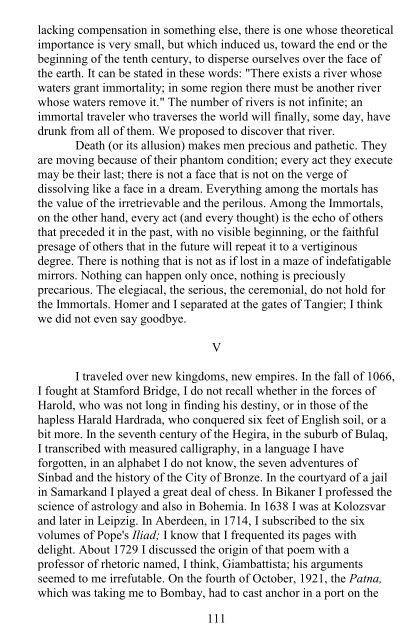Jorge Luis Borges - Labyrinths
Jorge Luis Borges - Labyrinths
Jorge Luis Borges - Labyrinths
Create successful ePaper yourself
Turn your PDF publications into a flip-book with our unique Google optimized e-Paper software.
lacking compensation in something else, there is one whose theoretical<br />
importance is very small, but which induced us, toward the end or the<br />
beginning of the tenth century, to disperse ourselves over the face of<br />
the earth. It can be stated in these words: "There exists a river whose<br />
waters grant immortality; in some region there must be another river<br />
whose waters remove it." The number of rivers is not infinite; an<br />
immortal traveler who traverses the world will finally, some day, have<br />
drunk from all of them. We proposed to discover that river.<br />
Death (or its allusion) makes men precious and pathetic. They<br />
are moving because of their phantom condition; every act they execute<br />
may be their last; there is not a face that is not on the verge of<br />
dissolving like a face in a dream. Everything among the mortals has<br />
the value of the irretrievable and the perilous. Among the Immortals,<br />
on the other hand, every act (and every thought) is the echo of others<br />
that preceded it in the past, with no visible beginning, or the faithful<br />
presage of others that in the future will repeat it to a vertiginous<br />
degree. There is nothing that is not as if lost in a maze of indefatigable<br />
mirrors. Nothing can happen only once, nothing is preciously<br />
precarious. The elegiacal, the serious, the ceremonial, do not hold for<br />
the Immortals. Homer and I separated at the gates of Tangier; I think<br />
we did not even say goodbye.<br />
V<br />
I traveled over new kingdoms, new empires. In the fall of 1066,<br />
I fought at Stamford Bridge, I do not recall whether in the forces of<br />
Harold, who was not long in finding his destiny, or in those of the<br />
hapless Harald Hardrada, who conquered six feet of English soil, or a<br />
bit more. In the seventh century of the Hegira, in the suburb of Bulaq,<br />
I transcribed with measured calligraphy, in a language I have<br />
forgotten, in an alphabet I do not know, the seven adventures of<br />
Sinbad and the history of the City of Bronze. In the courtyard of a jail<br />
in Samarkand I played a great deal of chess. In Bikaner I professed the<br />
science of astrology and also in Bohemia. In 1638 I was at Kolozsvar<br />
and later in Leipzig. In Aberdeen, in 1714, I subscribed to the six<br />
volumes of Pope's Iliad; I know that I frequented its pages with<br />
delight. About 1729 I discussed the origin of that poem with a<br />
professor of rhetoric named, I think, Giambattista; his arguments<br />
seemed to me irrefutable. On the fourth of October, 1921, the Patna,<br />
which was taking me to Bombay, had to cast anchor in a port on the<br />
111


